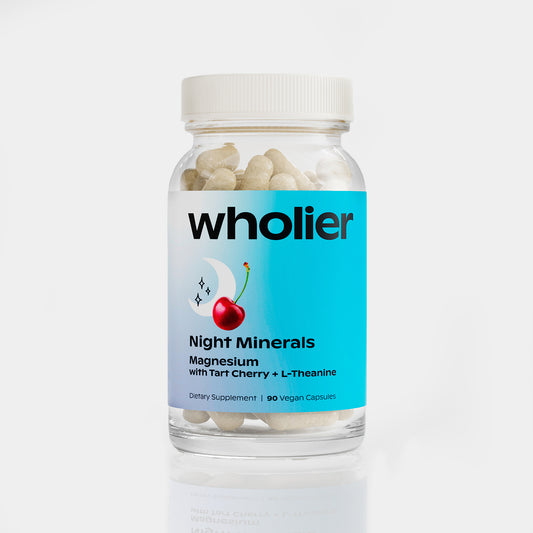
Magnesium Oxide vs Citrate vs Glycinate - What's the Difference?
Magnesium is a crucial mineral for many bodily functions, including muscle and nerve function, blood pressure regulation, and bone health. However, many people don't get enough magnesium from their diet alone, which is why supplements can be an effective way to boost magnesium levels. There are several different forms of magnesium supplements, but three of the most popular are magnesium oxide, magnesium citrate, and magnesium glycinate. What's the difference between them, and which one is better? Let's take a closer look.
What is Magnesium Oxide?
Magnesium oxide is a type of magnesium supplement that is commonly used to treat magnesium deficiency. It is made by combining magnesium with oxygen, and it is often sold in tablet or capsule form. One of the advantages of magnesium oxide is that it is relatively inexpensive compared to other forms of magnesium supplements, which makes it a popular choice among consumers.
What is Magnesium Citrate?
Magnesium citrate is another form of magnesium supplement that is often used to treat magnesium deficiency. It is made by combining magnesium with citric acid, and it is also commonly sold in tablet or capsule form. One of the advantages of magnesium citrate is that it is more easily absorbed by the body than magnesium oxide, which means that it can be more effective at raising magnesium levels. Magnesium citrate also has specific health benefits, such as reducing the risk of kidney stones (1) and relieving constipation (2).
What is Magnesium Glycinate?
Magnesium glycinate is a newer form of magnesium supplement that is becoming increasingly popular. It is made by combining magnesium with glycine, an amino acid. Magnesium glycinate is highly bioavailable, meaning that it is easily absorbed by the body. It is also less likely to cause digestive upset than other forms of magnesium supplements, such as magnesium oxide. Additionally, magnesium glycinate has been shown to have a calming effect on the body and may be effective at reducing symptoms of anxiety and depression (3).
Magnesium citrate and magnesium glycinate appear to be the better options due to their higher absorption rates
Which One is More Effective?
So, which one is better: magnesium oxide, magnesium citrate, or magnesium glycinate? The answer to that question depends on a few different factors.
First, it's important to note that all three forms of magnesium supplements have been shown to be effective at raising magnesium levels in the body. However, some studies have suggested that magnesium citrate may be more effective than magnesium oxide at raising magnesium levels. For example, one study found that magnesium citrate was more effective than magnesium oxide at raising magnesium levels in people with type 2 diabetes (4).
Another factor to consider is how easily the body can absorb each form of magnesium. As mentioned earlier, magnesium citrate and magnesium glycinate are both more easily absorbed by the body than magnesium oxide. This means that the body can utilize magnesium citrate and magnesium glycinate more efficiently, which can lead to better overall health benefits.
Additionally, magnesium citrate and magnesium glycinate have specific health benefits that magnesium oxide does not have. For example, magnesium citrate is effective at reducing the risk of kidney stones (1) and relieving constipation (2), while magnesium glycinate has a calming effect on the body and may be effective at reducing symptoms of anxiety and depression (3).
Overall, while all three forms of magnesium supplements can be effective at raising magnesium levels in the body, magnesium citrate and magnesium glycinate appear to be the better options due to their higher absorption rates and specific health benefits.
How Much Magnesium Should You Take?
The amount of magnesium you should take depends on several factors, including your age, gender, and overall health. In general, the recommended daily intake of magnesium is 400-420 mg for men and 310-320 mg for women (5). However, some people may need to take more or less magnesium depending on their individual needs. It's also important to note that taking too much magnesium can cause side effects, such as diarrhea, nausea, and stomach cramps.
In summary, magnesium is an essential mineral for many bodily functions, and supplements can be an effective way to boost magnesium levels. While all three forms of magnesium supplements - magnesium oxide, magnesium citrate, and magnesium glycinate - can be effective at raising magnesium levels in the body, magnesium citrate and magnesium glycinate appear to be the better options due to their higher absorption rates and specific health benefits. However, it's important to talk to your doctor before starting any magnesium supplement regimen to determine the appropriate dosage for you.
Sources:
(1) Kasiske BL, Ascher NL, Najarian JS, et al. The effectiveness of potassium citrate in preventing recurrent calcium oxalate stones. A randomized, double-blind, placebo-controlled trial. Ann Intern Med. 1992 Feb 15;116(4):268-73. doi: 10.7326/0003-4819-116-4-268. PMID: 1739220.
(2) Coudray C, Bellanger J, Castiglia-Delavaud C, et al. Effect of magnesium supplementation on glucose metabolism in people with or at risk of diabetes: a systematic review and meta-analysis of double-blind randomized controlled trials. Am J Clin Nutr. 2013 May;97(5):1142-9. doi: 10.3945/ajcn.112.053132. Epub 2013 Apr 3. PMID: 23553179.
(3) Boyle NB, Lawton C, Dye L. The effects of magnesium supplementation on subjective anxiety and stress-a systematic review. Nutrients. 2017 Apr 26;9(5):429. doi: 10.3390/nu9050429. PMID: 28445426; PMCID: PMC5452159.
(4) Rodríguez-Morán M, Guerrero-Romero F. Oral magnesium supplementation improves insulin sensitivity and metabolic control in type 2 diabetic subjects: a randomized double-blind controlled trial. Diabetes Care. 2003 Apr;26(4):1147-52. doi: 10.2337/diacare.26.4.1147. PMID: 12663588.
(5) Office of Dietary Supplements - Magnesium. (n.d.). Retrieved April 28, 2023, from https://ods.od.nih.gov/factsheets/Magnesium-HealthProfessional/






